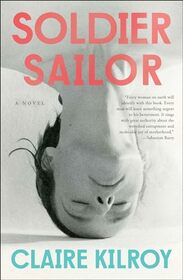"Soldier Sailor" by Claire Kilroy was just released here this past week and is on the shortlist for the Women's Prize for Fiction, the winner being announced June 13. It is the story of a woman raising her infant and losing herself as she finds her whole world turned upside-down. She is always exhausted, emotionally spent, and feeling bad about feeling bad. Of course she loves her son, repeating she would kill for him-- she would die for him. At her lowest point she momentarily abandoned him with the notion he could be raised by someone better.
She has no support system. Her husband has no understanding of her plight. He spends an excessive amount of time at work and then assumes a patronizing demeanor when she complains or begs for help.
"All I do is housework and childcare and I'm sleep-deprived and think-deprived because I never get a moment to myself, not even in the toilet... You'd like to diagnose postnatal depression because then it's not your fault."
Now here is my problem with the book, my problem. The first half is so tight, depicting the desperation so well-- it feels claustrophobic. The repeated head-butting with her dense husband was going nowhere and it was hard to keep plodding on. Luckily, she meets an old friend in the park, a man raising three children, and their interaction relieves a lot of her frustration and depressurizes some of the book's tension.
While I would not read the book again, it does do what it sets out to do. It depicts the absolute madness one can go through raising an infant. I suppose if it was light and breezy to read, it would not be communicating the absolute hell the mother was going through.
I received an advance review copy for free, and I am leaving this review voluntarily.
She has no support system. Her husband has no understanding of her plight. He spends an excessive amount of time at work and then assumes a patronizing demeanor when she complains or begs for help.
"All I do is housework and childcare and I'm sleep-deprived and think-deprived because I never get a moment to myself, not even in the toilet... You'd like to diagnose postnatal depression because then it's not your fault."
Now here is my problem with the book, my problem. The first half is so tight, depicting the desperation so well-- it feels claustrophobic. The repeated head-butting with her dense husband was going nowhere and it was hard to keep plodding on. Luckily, she meets an old friend in the park, a man raising three children, and their interaction relieves a lot of her frustration and depressurizes some of the book's tension.
While I would not read the book again, it does do what it sets out to do. It depicts the absolute madness one can go through raising an infant. I suppose if it was light and breezy to read, it would not be communicating the absolute hell the mother was going through.
I received an advance review copy for free, and I am leaving this review voluntarily.




